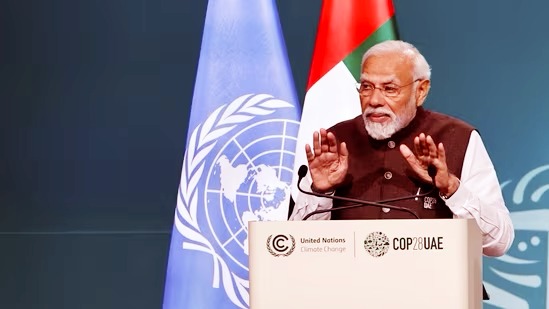More than 118 nations have signed a commitment to triple the worldwide installed renewable energy (RE) capacity to a minimum of 11,000 GW by 2030 during the UN Climate Summit. Notably, India refrained from signing the international agreement, despite expressing its endorsement of clean energy at the G20 Summit hosted in New Delhi.
Despite assuming a leadership role in advocating for the tripling of renewable energy at the G20, India opted not to sign the commitment. The decision stems from concerns about language about coal phase-out, which India found discomforting. Given India’s ongoing development and substantial energy requirements, it is unwilling to commit to reducing coal usage.
Whether or not India signs the commitment, its energy targets for 2030 indicate a threefold increase in renewable energy. Consequently, the current focus is on India securing technological advancements and financial commitments from the Global North to support the transition of resources from the Global North to the Global South.
The endorsers, spearheaded by the United States, the United Arab Emirates, and the European Union, have additionally vowed to increase the annual global average rate of energy efficiency improvements from 2% to over 4% annually until 2030. Both objectives were incorporated in the New Delhi Declaration in September, during which India and China, despite not supporting the commitment on Saturday, had concurred to exert efforts in the direction of tripling renewable energy capacity.
The commitment required under the pledge encompassed provisions calling for the reduction of unabated coal power and the cessation of new coal-fired power plant constructions. However, this stance does not align with the needs of developing countries that rely on coal to ensure energy access for their populations, exceeding a billion people.
Before COP28, Power Minister RK Singh emphasised that the objective is “aspirational” and contingent on the individual circumstances of each country. Speaking at the Sixth Assembly of the International Solar Alliance (ISA), Singh noted, “Different member countries have different national circumstances. So, every country is undergoing energy transition accordingly.”
There is a subtle implication that the trippling the renewable energy must be inherently linked with the gradual reduction of coal usage. India has justified its position on coal, particularly because, at this COP, other major emitters such as the US and the EU are persisting with plans for gas expansion, despite positive steps in climate finance, is still allowing for the inclusion of gas.
Many developed countries still rely on coal as a part of their energy requirements. In 2022, coal accounted for about 19.5% of the US electricity generation. While developing countries rely heavily on coal, India relies up to meet 55% of its energy needs. However, it’s important to note that 80% of total historical carbon dioxide emissions was contributed by the developed countries and they must lead in cutting down emissions from gas and oil first.
As an integral component of its Nationally Determined Contributions (NDCs), India has already pledged to attain 50% of its overall installed electric power capacity from non-fossil fuel-based energy sources by 2030. Currently, the nation’s cumulative non-fossil fuel capacity amounts to 186 GW, with approximately 99 GW currently in the construction phase. India has recognised that Renewable energy plays a crucial role in tackling the climate crisis; nevertheless, it necessitates access to essential minerals and other elements that must be economical, easily obtainable, and readily accessible.
Up until now, India has independently steered the narrative of its renewable energy expansion; however, with the anticipated threefold increase in renewable energy capacity, additional financial assistance will be necessary. The global expectation for developing nations to transition necessitates increased financial backing, facilitated through blended finance mechanisms involving Multilateral Development Banks (MDBs), green bonds, augmented contributions from equity investors, and involvement of insurance and pension funds.
The leadership of COP28, headed by the oil and gas-endowed UAE, urged all participating parties to promptly endorse the global pledge, emphasising the imperative of advancing clean energy initiatives for effective climate action. Earlier on, COP28 President Sultan Al Jaber, in collaboration with Fatih Birol, Executive Director of the International Energy Agency (IEA), released a summary of their co-chaired High-Level Dialogues. The summary underscored the necessity of gradually reducing both the demand and supply of fossil fuels within this decade to maintain the goal of limiting the global temperature increase to 1.5°C.
It is important to recognise the pattern that many of these developing countries are struggling with their coal carbon emissions and have historically been colonised countries. These same countries’ resources and labour were used to fund the Industrial Revolution that allowed the Western part of the world to become ‘developed’. Now when these colonised countries wanna have the same opportunity to develop their nations are stopped by the Western nations and give their policies as an example of climate protection. It is time that the world institution recognise that each nation has different requirements and circumstances; and for Western nations to recognise their historical privilege and try and give the same opportunity to the so-called ‘developing nations’.








